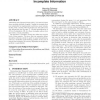Free Online Productivity Tools
i2Speak
i2Symbol
i2OCR
iTex2Img
iWeb2Print
iWeb2Shot
i2Type
iPdf2Split
iPdf2Merge
i2Bopomofo
i2Arabic
i2Style
i2Image
i2PDF
iLatex2Rtf
Sci2ools
105
click to vote
ATAL
2010
Springer
2010
Springer
Strategic planning for probabilistic games with incomplete information
Alternating-time Temporal Logic (ATL) [1] is used to reason about strategic abilities of agents. Aiming at strategies that can realistically be implemented in software, many variants of ATL study a setting where strategies may only take available information into account [7]. Another generalization of ATL is Probabilistic ATL [4], where strategies achieve their goal with a certain probability. We introduce a semantics of ATL that takes into account both of these aspects. We prove that our semantics allows simulation relations similar in spirit to usual bisimulations, and has a decidable model checking problem in the case of memoryless strategies (for memory-dependent strategies the problem is undecidable). Categories and Subject Descriptors I.2.4 [Knowledge Representation Formalisms and Methods]: Temporal logic General Terms Theory Keywords Alternating-time temporal logic, incomplete information, probability
Related Content
| Added | 08 Nov 2010 |
| Updated | 08 Nov 2010 |
| Type | Conference |
| Year | 2010 |
| Where | ATAL |
| Authors | Henning Schnoor |
Comments (0)

